#it was a set of raw dice
Text
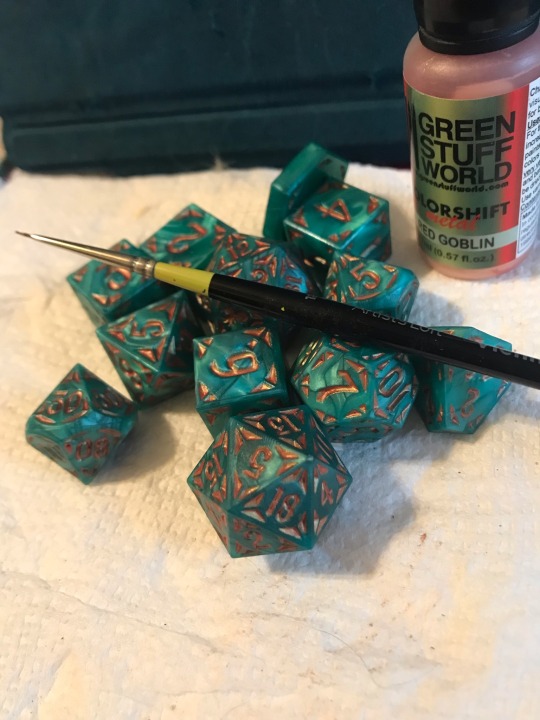
Been a while since I dice posted eh? Remember these? Finally got around to finishing them.
#raptor crumbles#dice set#yeah i know#theyre kraken#yes im aware of their bullshit#these were a gift from my husband… two years ago#it was a set of raw dice#sanded and finished them up with some paint#based the numbers with a citadel copper and topped with the chameleon paint seen there#i need to catch them in the light for you#its a nice firey effect
21 notes
·
View notes
Text
dice polishing . . . . . . . . hard
#i finally got the supplies together to polish a set of raw dice i bought years back#but after spending 2 hours on a single D6#i i get why sharp edge dice are priced like that sdkfjhg#like cool news is it's super super smooth to the touch and the edges are Crisp™#and when you put it on the table it reflects the face that's facing the light onto the surface#but there's still a bunch of microscratches that has me like#awe :(#also i had been hoping i could get it smooth enough that the interior would be clearer#and you could see the glitter more clearly#but it turns out the resin is just kind of foggy in general#ala fake moonstone consistency#which is nice but awe :(#alas . . . . . it's premade dice for me . . . . . . .#i say as if i don't have like 75 sets of dice already#(this is not an exaggeration. i love dice.)
10 notes
·
View notes
Text
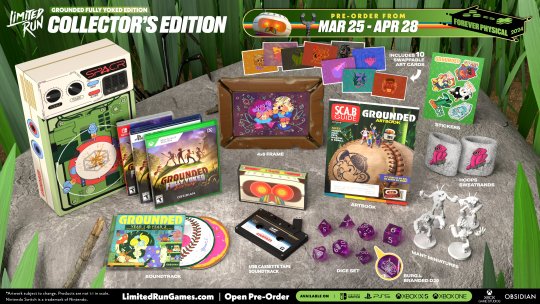
This is an attack against me personally.
1 note
·
View note
Text
System Overview - LUMEN
This week has been a break from my regular recommendations to cover a few popular game systems and talk about what makes them tick. This week, we're covering the fast-paced combat-friendly LUMEN system.
This is all the systems I'll be covering this week, but I hope to do some more system overviews in the future!

LUMEN is a game system originating from Spencer Campbell of GilaRPGs, for use in his game LIGHT. It has gained popularity over the past few years due to its ability to replicate fast, powerful combat, and a simple set of rules.
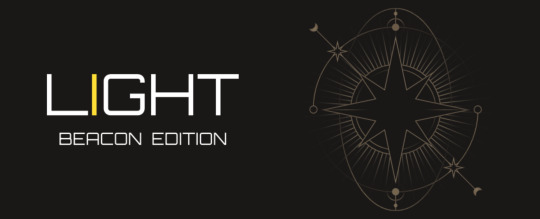

As a disclaimer, I haven’t played any LUMEN games yet (although I really really want to give NOVA a go). What I have seen is a consistent amount of high-quality, exciting games being released over the past few years using the LUMEN system. The SRD is only 13 pages long, and the pieces are simple enough to pick up, re-mix, and turn into something engaging, which makes LUMEN a great option for new game designers - especially since the designer really wants to see what people are making with this toolkit.
So, let’s talk about some of the pieces that make up this game.

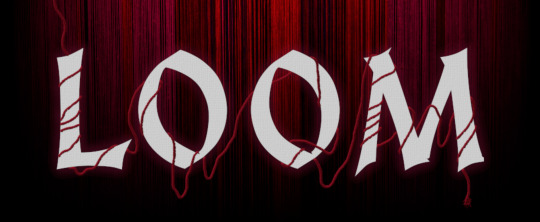
Attributes as Approaches
LUMEN gives your characters 3 stats that define how they approach an obstacle, rather than defining a specific skill. You’ll have something for raw power, one for quickness and speed, and one for precision and details. Your characters are expected to be professionals, the best of the best. Of course they know how to fight - this a power fantasy, after all. By focusing on an approach rather than a list of skills, these stats are also flexible: if you are using your raw power, you could open a door, swing a sword, or pull someone back from a ledge.
Depending on the game you’re using, the names for your approaches may differ. In Hedge, your approaches include Might, Sleight and Bright. In LOOM, these are re-tooled into Passion, Fleetness and Serenity.
This way of building a character is very good for players who may not want to juggle a number of different values in their head, and keeps the table focused on what the battle looks like more than anything else. It also makes a statement on what kinds of actions your characters don’t need to bother rolling for. No perception checks, minimal social obstacles, and don’t bother doing a memory check in this system. In LUMEN, you’re here to kick ass.
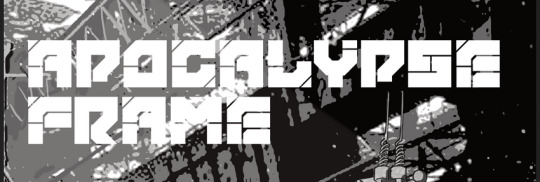
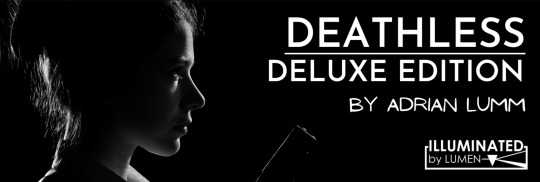
Dice Pools & Staggered Success
The number attached to your selected approach determines how many dice you roll to do an action. The highest number rolled is the only result you need to focus on.
Similar to Blades in the Dark and Powered by the Apocalypse, LUMEN uses a series of staggered successes. However, unlike the previous two games, success is a little more likely - 2/3 of the time, you’ll succeed. On a 1-2, the action failed with a consequence. On a 3-4, the action succeeds with a complication. On a 5-6, the action succeeds, no problems in sight. The difference in probability compared to Blades is one decision that indicates how powerful your characters are; they’re less likely to fail on any given roll.
To add a layer of complexity, you can include specific scenarios that determine how many dice you roll. For example, in Apocalypse Frame, there is a difference between rolling while inside or outside of your mech. When outside of your mech, a character subtracts 1 dice from their dice pool, and when attacking with your mech, you use a number attached to your Armament, rather than your Attributes. There are also character class abilities that may give you extra dice, such as the Ancient Technique ability attached to the Ancient class in Deathless. These abilities will only give you extra dice in very specific situations.


Character Classes
One thing is common among all three of the systems that I’ve talked about this week and that’s pre-packaged character abilities. LUMEN doesn’t use playbooks though, possibly because the characters are so lightweight that they wouldn’t take up that much space on a piece of paper.
Your class will come with special moves, abilities or gear that sets you apart, and will likely also define your play style. In Black Hole Era, for example, you are spaceships with system arrays and weapon bays. A Warlord ship has powerful long-range particle beams, while an Inquisitor ship has the ability to teleport or turn invisible.
That being said, you don’t have to use character classes with this system. In Wild Duelist, the game presents the character options as either a static stat build, from which you choose a few different options, or a character life path, in which you roll randomly to determine your heritage, weapons, approach scores and special powers.
Your character powers will usually come with a few important pieces of information: how they affect the field of play, what their range is, and how much it will cost you to use them. You do not roll to use your powers: you are powerful characters, and when you choose to do something cool, it works. In some games, your powers can be get more powerful as your character advances, or have tags added to increase range or damage dealt. Because LUMEN is meant to replicate combat-heavy video games, it also is designed to replicate the ability to customize your character to match the combat style that you prefer.



Room to Add Complexity
The LUMEN system is quick and only has a few core pieces, but there’s plenty of room to add more complexity in order to incorporate factions, long campaigns, and special details.
In Emblems of Their Dying Breaths, characters dig into dungeons that are procedurally-generated using a deck of playing cards. .brawl centres its combat on a map, using miniatures to help your players strategize as they fight in a cyberpunk arena. Clean-Up Crew diversifies the resources needed to pay for special powers, making enemy drops more interesting - and more necessary, if you’re going to find the specific resource you need.
The original designer is also updating and re-designing LUMEN, with the plans to release a LUMEN 2.0 SRD that does away with dice, health, and a few other pieces. You can check out some of his design thoughts on his YouTube channel, and take a peek at how this new version of LUMEN will play out in his game DUSK.
Meanwhile, let’s talk about some more games in the LUMEN series that I have yet to highlight on this blog.




Brawl City is a Street-Fighter game, still in development.
Dust is a game about surviving in a post-apocalyptic world, inspired by works such as The Book of Eli, and 9.
Photon is a two-player game about fighting a Singularity trying to consume the world.
paktbound is inspired by Dishonored and shackles your characters to a Stranger who sends them on heists in a rotten world.
If you want to check out more LUMEN games, there's a compiled list of games kept by Spencer Campbell, as well as a LUMEN collection that I'm adding games to as I find them.
Do you have any favourite LUMEN games? What kind of video game do you think would work well for this system? Share them in the comments and tags!
153 notes
·
View notes
Text
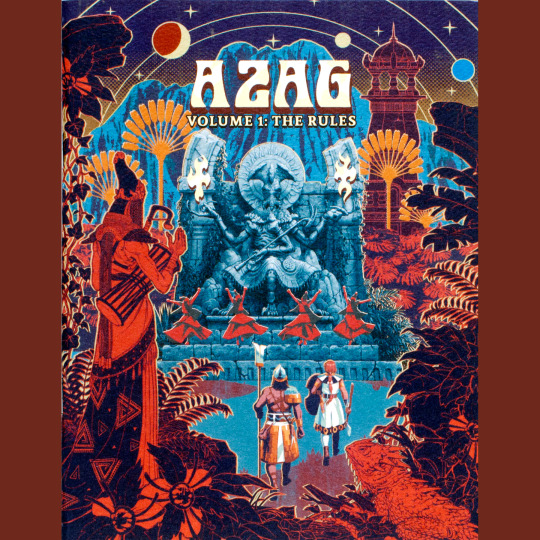
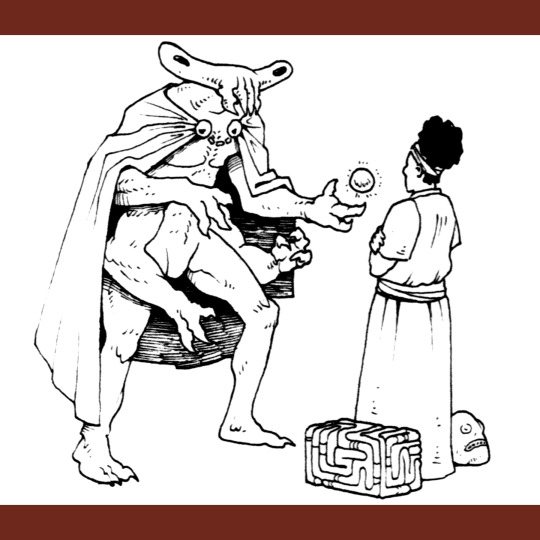
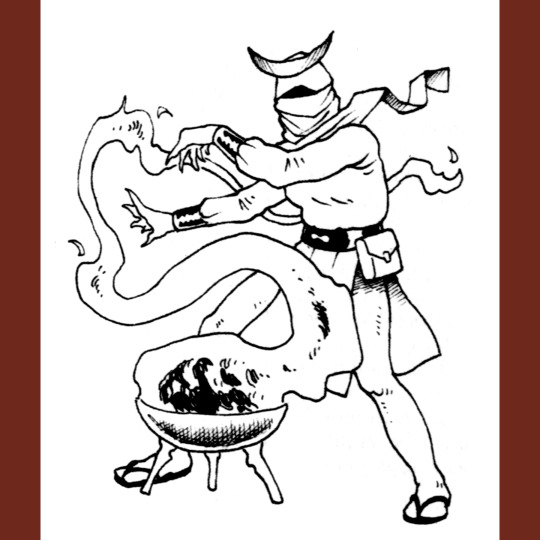
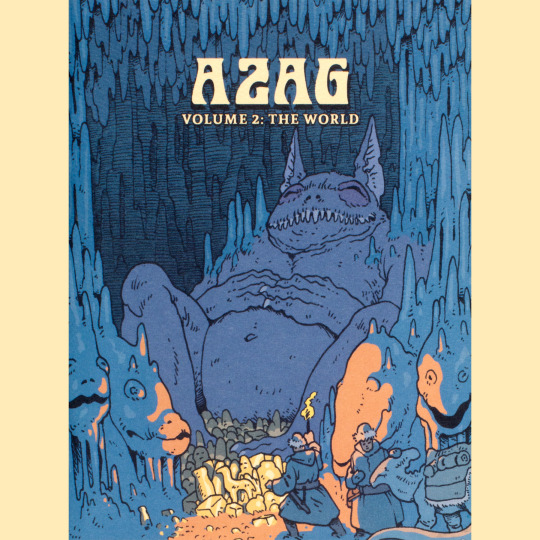
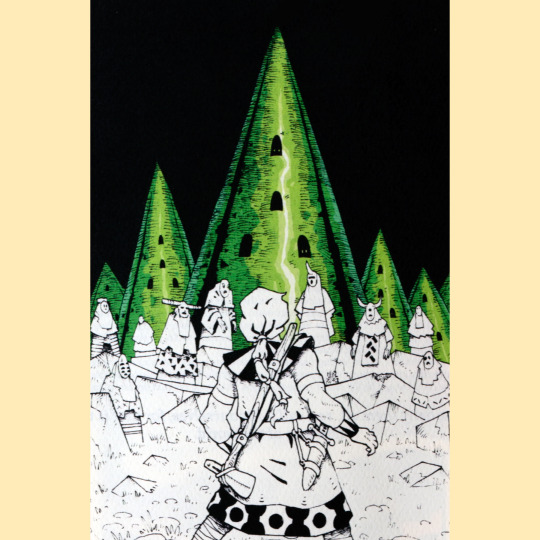
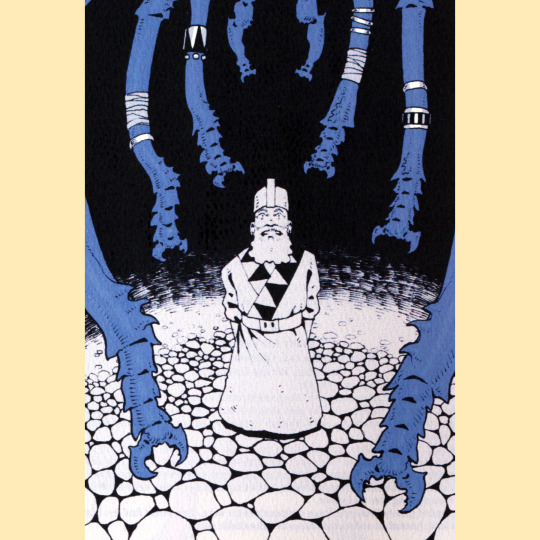
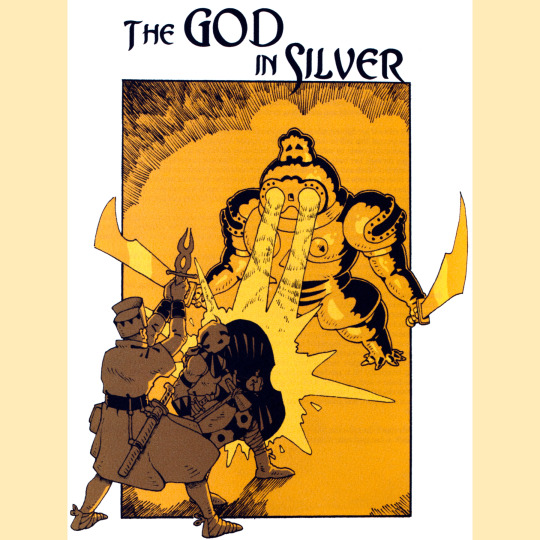

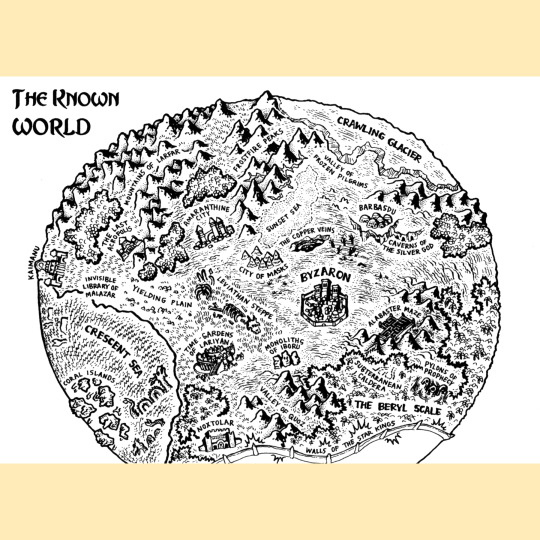
Azag (2021) is a neat 2-volume rule set and game setting. This is the limited edition from LFOSR. It descends, primarily, from Dungeoneer/Advanced Fighting Fantasy, which makes it a cousin of sorts to Troika. I am tempted to call it the less weird cousin, but that isn’t entirely true — it is just a different sort of weird.
Three attributes. Basic rolling is 2d6, rolling high in opposed contests, rolling low when testing your attributes. Unlike Troika, other dice can be swapped in to simulate greater ease or difficulty — climbing during a blizzard, say, might warrant 2d8 or 2d10 for a Stamina test, depending on the severity of the storm. Combat is more formally structured than Troika, but still pretty fast and loose compared to other games. There are mechanics for social encounters, too, with an ante system that spends Luck, which I really like — it is nice to have a mechanical underpinning for social stuff if you need it. Spellcasting is point-based and the player rolls for success, putting it essentially in line with the skill system. Failure invites calamity. And spellcasters can duel; in this case, casting is an opposed test, and the loser suffers calamity (rather than the cast spell effect — you’re basically dealing with raw arcane energy in a duel). Its a fun, flexible little system!
The world is nice too, cobbled thematically out of early-20th century pulp traditions, particularly Clark Ashton Smith’s stories and Lovecraft’s Dreamlands, both of which feel less explored than say, Conan. It feels a little more restrained and fuzzier at the edges than something like Hyperboria or even DCC. I loooove Logan Stahl’s art, particularly the cover of Volume 2, featuring a snoozing Tsathoggua. In game terms, the world is defined by micro fiction and random tables for encounter seeds and such. These make for an interesting approach that is atmospheric without being overly locked into specific details.
299 notes
·
View notes
Text

[ID: A close-up of a baguette lined with sliced cucumber and topped with cauliflower coated in a deep red sauce, diced tomato, and a white sauce. End ID]
Sandwich with sesame-gochujang cauliflower and garlic-yoghurt sauce
Inspired by Vietnamese bánh mì thịt, this submarine sandwich pairs fresh vegetables with fried cauliflower coated in a spicy, tangy, savory, and sweet sauce. Toasted sesame oil and the fermented notes of gochujang add depth and complexity to the mildly nutty backdrop of the cauliflower, while the raw garlic in the yoghurt sauce brings the taste profile to a sharp head.
Also consider pairing the gochujang cauliflower with vegetables of your choice in a rice bowl or salad.
Recipe under the cut!
Patreon | Paypal | Venmo
Ingredients:
Serves 4.
For the dish:
4 bánh mì, or 2 freshly baked baguettes halved and cut open
300g cauliflower florets (1/2 a small head)
1/2 cucumber, sliced
2 inches carrot, julienned
1 small roma tomato, diced
Other toppings of choice
Drizzle toasted sesame oil
1 Tbsp toasted sesame seeds
For the batter:
2 Tbsp (15g) all-purpose flour
2 Tbsp (20g) potato starch
1 Tbsp (10g) egg replacer for baking (optional)
Water
For the gochujang sauce:
2 Tbsp gochujang
1 Tbsp gochugaru (Korean red chili flakes)
1 Tbsp granulated sugar
1 Tbsp Korean soy sauce
2 tsp rice vinegar
2 cloves garlic, grated
1 green onion, sliced
Pinch salt
Pinch MSG (optional)
Several cracks ground black pepper
Water
For the yoghurt sauce:
1/4 cup non-dairy yoghurt
1 clove garlic, grated
1 tsp high-fructose corn syrup, or sugar
1/2 tsp rice vinegar
Pinch salt
Instructions:
1. Break cauliflower into smallish florets and wash. Prep vegetables.
2. Mix all gochujang sauce ingredients and use a blender or immersion blender to pulverise the green onion. Add a bit of water as necessary to achieve a slightly runny consistency. Set aside.
3. Mix all yoghurt sauce ingredients and whisk to combine. Set aside.
4. Heat a small pot with several inches of oil to 350 °F (175 °C). Mix all dry batter ingredients in a mixing bowl. Add just enough water to obtain a mixture the consistency of pancake batter. Do not overmix.
5. Coat cauliflower with batter and carefully drop one floret at a time into the oil. You may have to fry them in multiple batches. Fry until lightly golden brown and floating. Set aside onto a paper-towel-lined plate.
6. Increase the heat to bring the oil to 400 °F (200 °C). Fry cauliflower again for 30 seconds until deeply golden brown. Set aside.
If you aren't comfortable deep-frying, you may bake battered cauliflower at 400 °F (200 °C) for 30 minutes, turning over halfway through.
7. Heat a large skillet on medium and cook gochujang sauce, stirring often, until thickened. Add cauliflower and stir to coat. Drizzle in sesame oil and sesame seeds and stir again.
8. Serve immediately with bread, vegetables, and yoghurt sauce.
105 notes
·
View notes
Text
With respect to the previous reblog—I sped up almost all of the Otohan combat to 1.5 and only put it back to normal when Sam started FCG's last turn. And it's not that I can't be invested in climactic combat or even really difficult climactic combat! I watched the fights with Ripley, Thordak, Raishan, Vecna, the Iron Shepherds, Uk'otoa, and Vespin Chloras, some of them multiple times, and I was invested the entire way through.
But here's the thing: I do not currently play DnD, and prior to watching CR I knew very little about the mechanics. I learned with the cast as I was watching C1, and as the show went on I paid more and more attention because I could see how the mechanics of combat interacted with the story. When there's a moment where the crunch of combat powerfully reflects a character's arc? That hits, even as someone with little personal knowledge of the PHB. I am not, however, invested in just watching three hours of combat for its own sake...and Otohan's build feels like combat for its own sake.
Obviously the cast is really invested in the story; it's their characters and they're the ones making the choices and rolling the dice. They've been doing this together for over a decade, and they're really impressed by the raw power of Otohan's build. But as a viewer? This simply is not fun to watch. I mean, there are some great moments for the Hells—all of Orym's nat 20s, Fearne using the power of Rau'shan and deliberately casting Blight through touch, Chetney's last words—but I don't know anything about Otohan. I don't know why she's here. I don't know what her motives are. I don't know why exactly she's so OP—"Legend of the Peaks" is just set dressing to me because none of the characters care about the Apex War and Matt has never forced the issue.
Like, sure, they're an exaltant Ruidusborn, but...okay? Why do they get legendary actions and resistances? Where'd their goofyass lil Lands End backpack even come from? Why are they here? No one can do a swagless villain monologue like Ludinus; no one can evade child support like Liliana. But who cares about Otohan, as a character and not just the scary hero-killer? That role in the story could be occupied by any well-built level 20 melee combatant and the narrative wouldn't miss anything.
Without all of the necessary development to get me invested, this just seems like she's OP just to make her "hardcore" or whatever—and Matt's never made a villain like that, so I know this could have been portrayed better and simply wasn't. As it stands, she's had more presence in the stupid Moon Moms fanon (which seems to have been found dead on Ruidus anyway) than she has in the actual canon of the show. I'm always happy when a villain dies, but in this case, it's just good riddance.
76 notes
·
View notes
Text
𝐂𝐎𝐎𝐊𝐈𝐍𝐆 𝐏𝐑𝐎𝐌𝐏𝐓𝐒 (𝐏𝐓. 𝟏)
so, i absolutely love cooking! it's a passion of mine, i've been cooking for my family for years, people seem to find my food edible enough, and i recently found myself unable to cook at all for about a week, resulting in this little list coming into existence! i'm most likely going to make more of these, simply because the dynamics in a kitchen are varied as hell, right? we have romantic couples who cook together as a hobby, there's professional restaurant kitchen settings, baking oriented stuff, cooking with kids, there's a LOT to be done w the topic! so these are more for the chaos of someone who cannot boil an egg to save their life, vs. someone who enjoys cooking and is widely considered to be a dab hand at it! DO NOT ADD TO THIS LIST! but i do hope you enjoy it as much as i enjoyed making it!
" hey, hey, it's okay! we'll scrape off the burnt bits! "
" here, let me chop the onions, okay? you can dice the peppers and beef; just be sure to do them on separate boards, yeah? "
" you... you know the wine was for the stew, don't you?! "
" i swear to you, i don't know how this happened. i followed every single instruction, word for word! "
" taste this and tell me what you think! "
" oh my god... this is AMAZING! you should have your own cooking show! "
" you're kidding me! no way this whole thing is vegan! it's just too good! "
" so, um... i might have possibly accidentally tipped the entire jar of cayenne pepper into the soup... and by might have, i mean definitely. "
" i think i'm gonna have to ask you to leave the kitchen before you hurt somebody. "
" it says here to fold in the eggs... now, tell me, how exactly does one do that? "
" i might have over-exaggerated my cooking skills... and blown up the oven. "
" look, it sounds gross, but i'm telling you, when it's cooked right, it's the best thing ever! "
" i lied to my date and now they think i'm this amazing cook when i'm absolutely not, so please, can you spare me the lecture and just teach me how to cook? "
" woah, woah, woah... try chopping like this. yeah, that's it. you won't chop off your hand this way. "
" so, um... how exactly did it manage to stay frozen solid on the inside, but scorch to a crisp on the outside? "
" okay, remember when it asked for fifty grams of sugar? yeah. i accidentally used salt. "
" well, at least we know the smoke alarms work, right? "
" i ruined three knives, i have a roast chicken embedded in my ceiling, my oven officially needs therapy, and so do i! wanna call it quits and order a pizza? "
" i swear, you're one of those kitchen gods who can make ice cubes taste fantastic! "
" this is the fun part! take that tenderiser, and beat the absolute crap out of that pile of steaks. "
" i'm trying so hard not to judge you right now, but... onion goggles?! "
" how on earth did you get pasta sauce on the ceiling? "
" you know every single firefighter in town knows my name? and my top three favorite comfort foods to bring each time i trigger the fire alarm? yeah. that's my culinary reputation. "
" hey. it's okay. this isn't the first time i've burnt dinner. i have taco bell on speed dial. "
" sometimes recipes just don't work out. and that's okay! what matters is that you tried. "
" i didn't realize it was even possible to burn water! "
" ah... i see where you went wrong. the recipe uses paprika. this is chilli powder. "
" quit eating the batter, or we'll have no cupcakes at all! "
" no! no way. i'm not tasting anything cooked by you; not since your orange juice gave me food poisoning. "
" the last time i tried to cook, my pot roast ended up on fire and put a hole in my dry wall. i had to hang paintings over it until i could refill the crater. "
" no, you cannot cook chicken medium-rare. wanna know why? because that means it's raw. and you'll end up with food poisoning. and i'll have to tell you what a moron you were to even think that was an acceptable thing to do in the first place. "
" i thought you teaching me how to cook would be all soft and friendly, like the great british bake-off! but it's more like hell's kitchen. "
" no tears in my kitchen, thank you! "
" six fires in three hours is your personal best! only problem is, we're making fruit salad... "
" i understand that it's meant to be salted caramel, but... exactly how much salt did you use?! "
#roleplay meme#rp meme#dialogue prompts#sentence starters#writing prompts#roleplay prompt#roleplay prompts#rp prompts#food tw#food mention tw
2K notes
·
View notes
Text
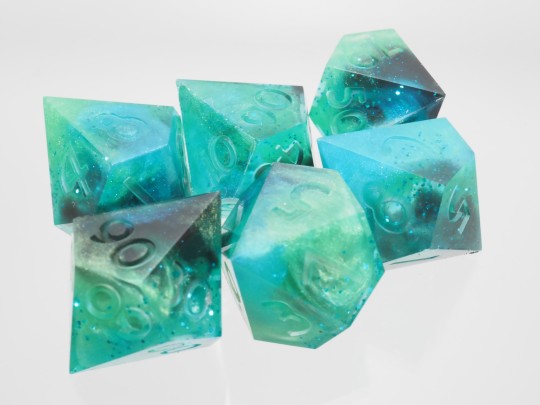
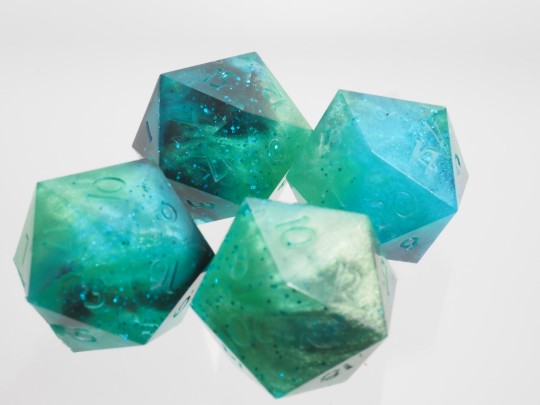
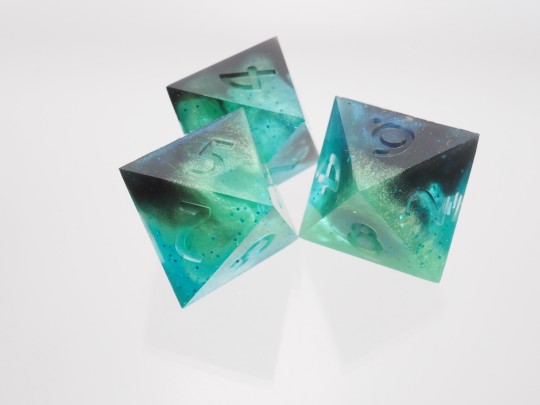
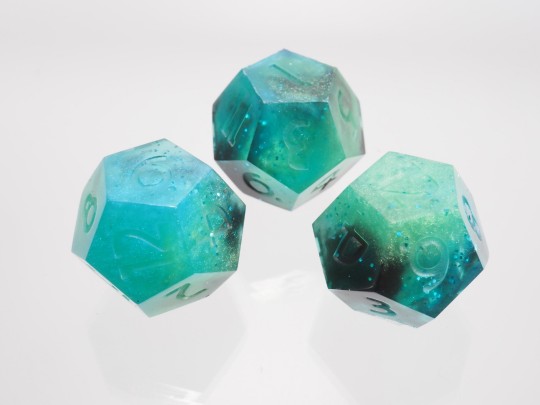
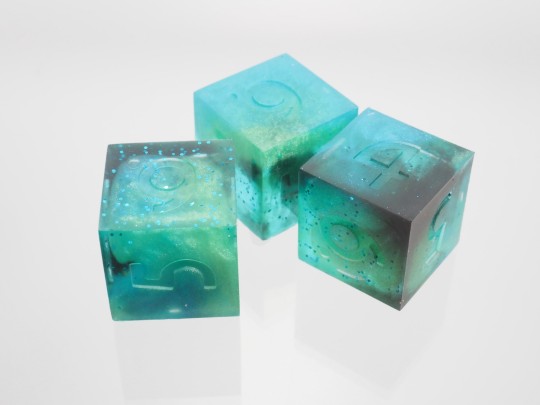
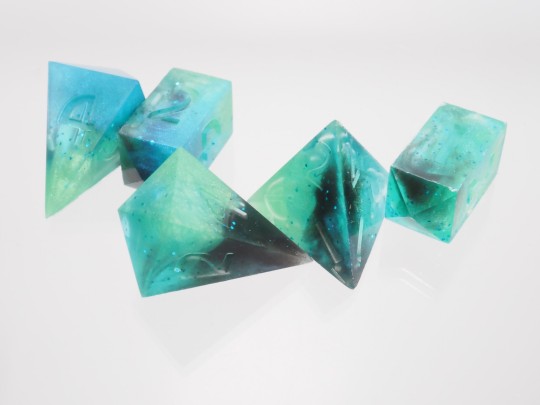
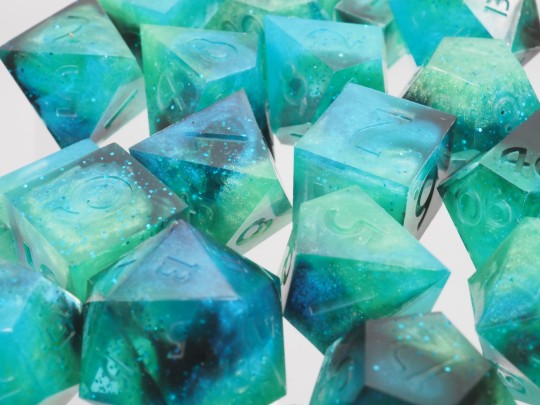
I made a few new "Galaxy Uranus" dice. They are part of the solar system series. I made a set of dice according to every planet. How do you like this one?
These dice are still raw and need some sanding and inking!
(Advertisement)
#planet#uranus#galaxy#solar system#dice#dnd#dnd5e#rpg#ttrpg#catinthedicebag#epoxy#handmade#resin#würfel#diceset#dungeonsanddragons#polyhedraldice
127 notes
·
View notes
Text
batfam as dnd players
Bruce: Doesn't really want to play, and when forced is absolute min/maxer. It does not even occur to him that he could play differently. He read the books, skimmed internet for best combos, and sticks to that. The backstory of his characters somehow always has something to do with masked vigilanites a'la Zorro or Grey Ghost.
Dick: Takes magical support characters like druids or bards, just to do some fun magic stuff and score very creative kills. He's the kind of a player that will make a plan to infiltrate a fortress by turning the team into elephants and flying them in (by means of conjure woodland beings) . He's not a min-maxer, but his creative use of wierd spells and abilities make his character super useful. His characters have simple but effective backstory, often connected with Babs's characters'.
Barbara: Plays basically only gnome barbarians, becuase she thinks its funny. She often makes INT the dump stat, and the rest of the players have to constantly remind her that SHE might have figured out the riddle, but her character with INT 8 would NOT. Loves combat and 3D-prints minis for her characters.
Jason: Lives to RP. His characters have deep and rich backstories, usually extremely dramatic and with many possible plothooks. He WILL try to talk to everyone in the tavern. his turn during the fight is the longest because he insists on describing in detail everything his character does. He often gets angry at the dice, becuase they spoil the 'great scene he had planned'. He often makes very supoptimal characters to fit the backstory (wizard with low INT, rogue with 10 in DEX, etc.) and gets pissed when they get killed easily. Will sometimes DM, and those scenarios are usually very, very light on combat.
Tim: Rules lawyer nr 1. He knows the rules by heart. He remembers half of the statblocks of monsters and complains if they are changed. Takes careful notes, and makes 100 theories on everything in game. His characters ALWAYS check the ceiling when coming into a room. He has a tendency to metagame. Often DMs.
Cas: Doesn't really like to play, similarily to Bruce, but when she does she usually plays support (usually clerics), so that she can heal the party. Enjoys exploration, and is more likely to play in scenarios with a lot of ruin exploration, dungeon crawling etc.
Steph: Makes joke characters like Dildo Swaggins the lustful bard, but somehow always ends up with the most dramatic story developments for her character and most heroic, tearjerking deaths. Like Jason she loves to RP more than fight, and their character often have scenes of sitting by the fireplace and talking during short rests. Has several sets of dice and tracks their 'luck'. Sometimes DMs wierd but higly creative one-shots.
Damian: Pretends not to like to play, but after first (frankly quite disasterous) session, he got sucked in. He loves making characters, and has a whole folder of character sheets of his OCs, with drawn pictures and everything. Makes tokens for the whole group, and can be (easily) convinced to draw maps for the sessions. Rules lawyer nr 2, but unlike Tim who does the lawyering to keep the game clean and running RAW, Damian will try to give himself as much advantage as possible. No one lets him DM, because he is not yet ready for such power.
Alfred: Does not play. He hates DND with passion and wishes they would play something less rule-heavy so that he could play with them and roleplay in peace without those pesky dice... and why are there so few social skills for a character! This is not his cup of tea, thank you very much. Jason sometimes convinces him to stand in for the important NPCs, and he always knocks it out of the park.
#batfamily#headcanon#bruce wayne#dick grayson#damian wayne#alfred pennyworth#jason todd#stephanie brown#barbara gordon#cassandra cain#dnd
61 notes
·
View notes
Text
Diceless skills
the more i run and play RPGs, the more i start to be skeptical of dice. i like dice - i like rolling them, i think there's a whole lot of areas where they make a game better. but i'm skeptical about how they're the assumed default for how you resolve stuff.
ramble about ttrpg design under the cut
the way D&D handles skills is simple: you roll a die. if it's a big enough number (modified by the difficulty of the task & how good you are at it) you succeed. if not, you fail (usually meaning nothing happens). what this amounts to is a random chance to fail.
there's storygames that use more nuanced mechanics - no null result! rolling low is less 'total failure' and more that some twist happens. that can be more interesting. (i'm not familiar with a whole lot of storygames, so this is an oversimplification based on my limited knowledge, correct me if i'm wrong)
now these generally work fine for what those games are trying to do. they use uncertainty to generate drama: oh, shit, i failed the super-important deception check to convince the guards i'm a harmless merchant, now the situation escalates. perfectly good mechanic for your standard 5e campaign.
but that kind of stopped working as soon as i branched out into OSR games.
see, dice fill a very different role in an OSR game. these systems are designed with high lethality in mind - your fighter has 1d8 hit points, a sword deals 1d8 damage, you just die at 0HP. if you run them like 5e, you start killing PCs left at right and it can be very demoralizing.
the intended playstyle is, instead, that the players circumvent die rolls through cleverness - once combat starts, your fate is in the hands of the dice, so you make plans that avoid combat or swing the odds so far in your favor that the risk is worth it. so the dice still feel like they fill a good role, making combat deadly and unpredictable on purpose to set that dynamic.
this breaks down when you use the same logic for basic task resolution. most OSR games don't have skills, but i often see the misconception that you're supposed to use raw ability checks instead or the GM makes up a success chance on a d6. these fundamentally do the same thing as a traditional roll-to-win skill system: make luck a factor in basic task resolution.
the problem is OSR games have such high stakes in the form of very possible character death that involving luck in basic task resolution can be disproportionately punishing. "you failed the stealth check, roll initiative!" works alright in 4e or 5e where combat is the game, but in the OSR that's a line you very rarely want to cross.
(this is also why old-school D&D isn't my OSR of choice, since the thief just makes a bunch of tasks into die rolls with abysmally low success chances you'd never want to rely on)
instead the expectation is the GM is both generous and transparent with task resolution. most things should be a success or not doable; if something has notable consequences or is iffy enough to require a die roll, the GM should tell the player what is at stake before they commit to taking the action. (die rolls still have a place in terms of risk management but i feel they should be opt-in.)
this has worked pretty well in my games, but i missed skills as ways to differentiate PCs and allow specialization into different areas. it's a lever for customizing your character that i really like about D&D, helping two members of the same class feel distinct. so the best skill system i've found that still works well in this environment is this one borrowed from Joseph Manola:
Spending a skill slot on something means you are really good at that skill, and will always succeed at attempts to use it (emphasis mine) except under severely adverse conditions. If you have the Climbing skill, for example, you can automatically climb any normal surface you encounter, although doing so quickly or quietly might still require a Dexterity check.
it's a houserule i put into my Grave campaign for my home group and a core mechanic for iron halberd, and everywhere i've put it, it's run smooth as butter.
it feels like it slots into the OSR playstyle so, so much better than the old-D&D thief skills. die rolls are almost a punishment, so why bake them into the task resolution players use when playing as intended? the diceless skills are instead a reliable tool in your toolbox, and problem-solving with them should be rewarded.
i've also worked out what i think is the ideal number of skills for an average PC - two. less than that feels highly restrictive, while more than that feels like you have everything you really want for most PCs (thus devaluing PCs that spec into having more than two). i let players drop an attribute by 1 for an extra skill or vice versa, to allow for some PCs to be more skill-focused than others.
other variations on this idea include Dice Goblin's time, gear, skill system. i like this one because it's easy to houserule in a way for a player to double down on a skill - spending 2 skills on the same skill just lets that skill count for 2 requirements instead of 1.
overall they've been fun to use and players feel good using them. they do lose that drama aspect, but i find it easy enough to create tension in other ways in an OSR game. i might even try putting them in a non-OSR game because they've just worked really well.
42 notes
·
View notes
Text
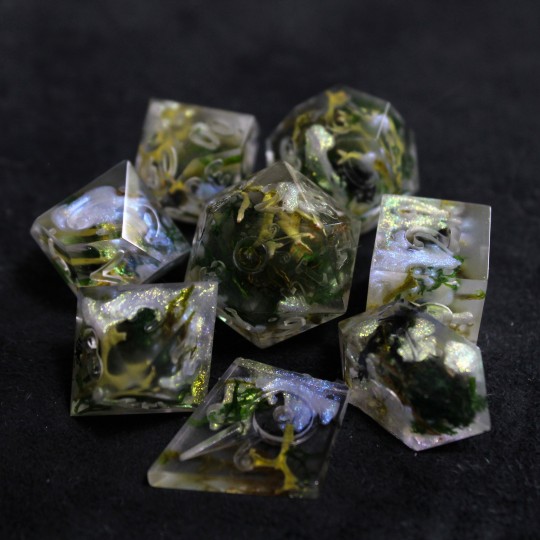

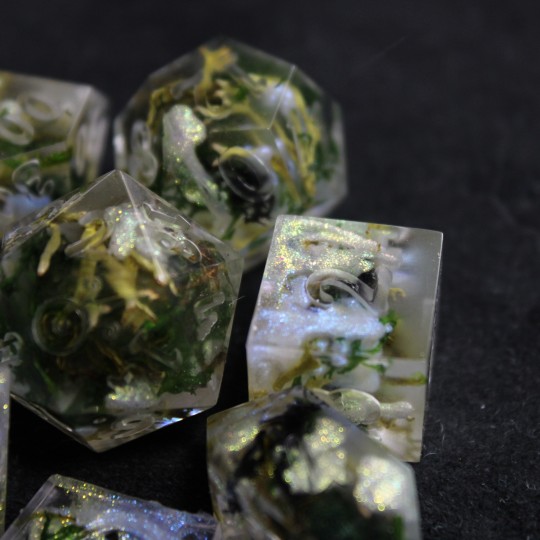
One of my new favorite things is doing a mica drop through moss. It's just so drippy!
This set of raw dice sold, but I may have to make more because 😍
58 notes
·
View notes
Text
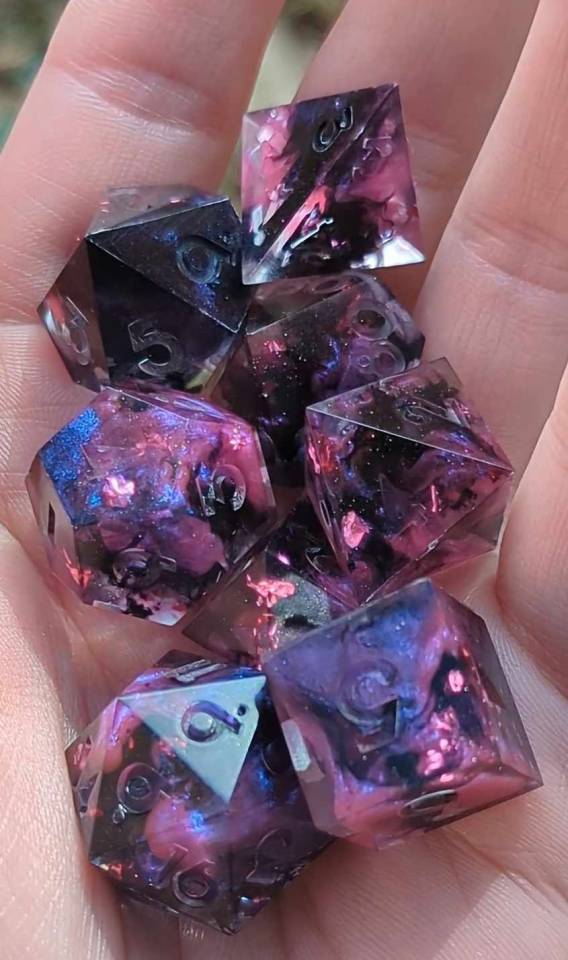
Just pulled this raw set today, inspired by Drolta Tzuentes from Castlevania: Nocturne! I'm not usually a big pink dice person, but I'm lowkey obsessed with these (and her)
Who should I do dice for next?? Literally everyone on the show is on my list
76 notes
·
View notes
Text
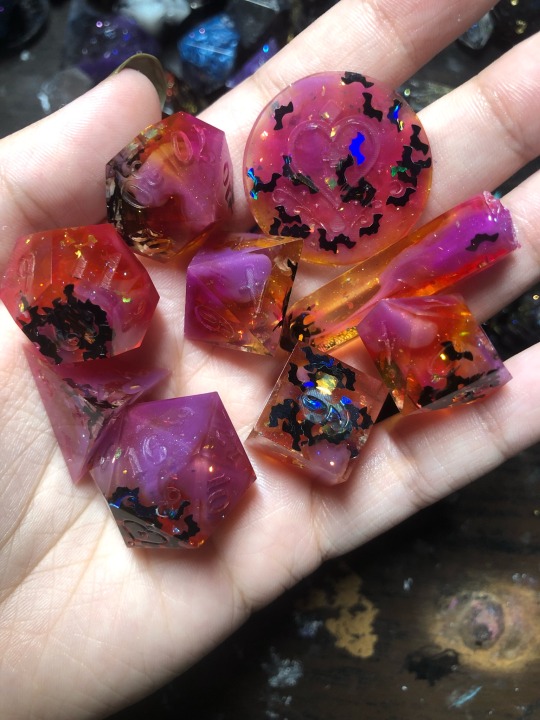
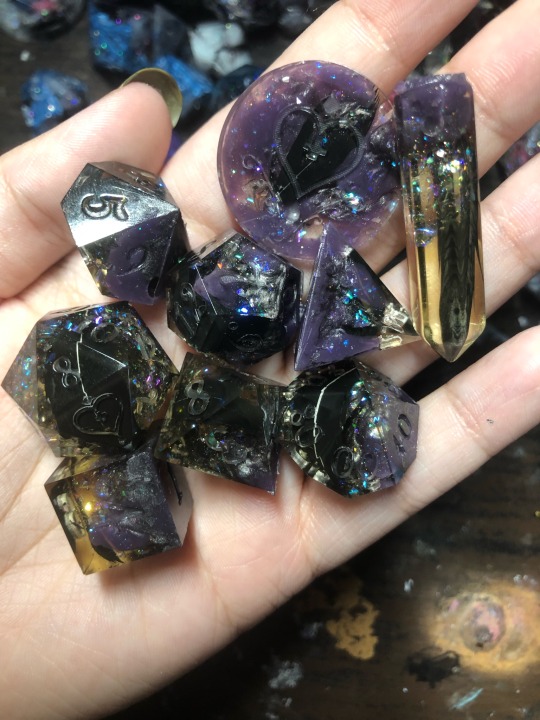
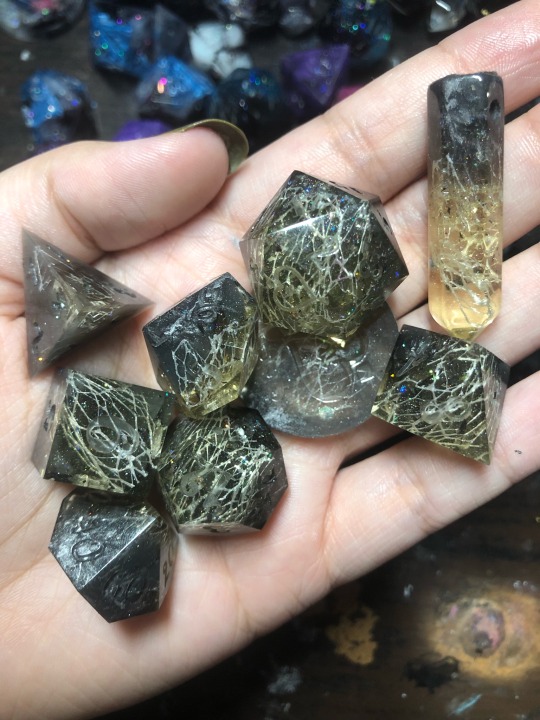
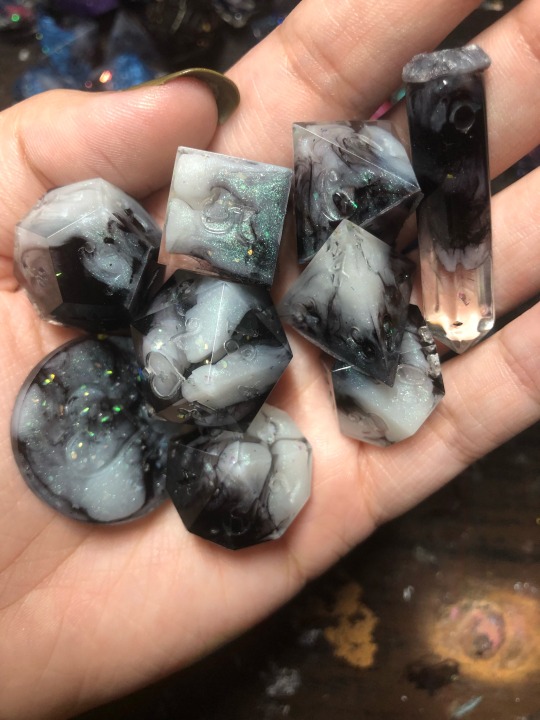
It’s a bit short notice but there will be a shop update this Saturday September 16th at 3pm PT. I have 10 sets that need to be finished but might post some as raws for a discounted price.
#dnd#ttrpg#dungeons and dragons#handmade#resincraft#resin#resinwork#dice#dnd dice#dungeons and dragons dice
52 notes
·
View notes
Text
D&D basics for first-time watchers
The Player's Handbook is great, but a lot of people want to watch Dungeons & Dragons-centric shows without reading five hundred pages of rules. Below is a crash course of basic D&D stuff that's relevant to watchers (it gets more complex as the post goes on, so just read until you feel like it's getting too complex)
send this to anyone who is watching Dimension 20, Critical Role, or another D&D campaign for the first time!
The Basic Basics:
dice are referred to using "d" (for dice) + the number of sides. So a typical cube die is a d6, and a 20-sided die is a d20. (d20 is the most used one)
"Nat 1" : stands for "natural 1." This is the lowest possible number on a d20, and is considered an automatic fail at most tables.
"Nat 20" : stands for "natural 20," and is the highest possible number on a 20, and an automatic success.
DM/GM: Dungeon Master or Game Master; works as a sort of video game computer. They run the whole game, including the world, combat, and any NPCs, as well as direct plot or storyline.
PC: Player Characters, people who play a single character at a time during a game.
NPC: Non-Player Character, a character played by the DM for PCs to interact with.
The Slightly More Complex Basics:
Ability Scores: the numbers that make the game work and form characters, (ex: Strength, Charisma), higher means the character is better at that skill, details below.
Class: a category which a character falls into, giving them specific skills, spells, or abilities, allowing them to directly manipulate the game world (ex: Wizard, Fighter), details below.
Race: really should be called species (ex: Human, Elf, Dwarf)
Combat: times when PCs are directly fighting NPCs or each other, uses a specific order and series of turns, details below.
Getting Pretty Complex: Skills and Skill Checks:
When it happens: when a character is attempting to do anything not seen as extremely simple (ex: walking in normal conditions does not require an ability check, but swimming in a violent tide probably will)
What happens: the player rolls a d20 and adds their modifier to it. These are specific numbers to each character and aren't worth memorizing, but this is how players will sometimes get numbers larger than 20 or lower than 1.
What are modifiers?: modifiers define how naturally good (positive modifier) or bad (negative modifier) a character is at a given skill. This number then gets added to the number on the d20.
What is a success?: the DM sets a number (known as Difficulty Class, or DC) that is needed to succeed. When the character succeeds using the steps above, they are able to do whatever is attempting to be done.
What is a failure?: when a character does not reach that DC, they fail whatever they are attempting to do.
Note: Saving Throws: saving throws are similar to ability checks but are required by an outside influence on a player. These are super complex and not necessary to enjoy watching.
Getting Pretty Complex: Ability Scores:
Strength: measure of a character's physical ability to punch, lift, push, or break something (raw muscle mass, usually).
Dexterity: a character's ability to be agile, dodge, react, avoid, or pass over difficult terrain (speed or agility).
Intelligence: a character's ability to retain knowledge, objectively analyze, and remember things (raw knowledge).
Wisdom: a character's ability to infer, connect dots without having all the answers, or see something not initially apparent (analysis or reasoning).
Charisma: a character's ability to bend others to their will, whether through kindness, flirting, or threats (influence).
Constitution: a character's ability to endure and resist, affects Hit Points (sheer willpower).
Very Complex: Combat
Initiative: rolled by all participants at the beginning of combat, defines the order of turns, uses Dexterity as a modifier
Turns: include movement of a certain distance (usually 30ft for most humanoids), an action (usually a major spell or attack), and a bonus action (minor spell or extra ability that applies only to certain classes)
Armor Class: the number that defines how difficult a character is to hit.
Hit Points: the amount of damage a character can take before falling unconscious
Falling unconscious: when a character hits 0 hit points, they begin making death saving throws, where they roll a d20 and add no modifiers. A 1-9 is failure, a 10-20 is a success, 3 failures = full dead, 3 successes = stable but still at 0 hit points and therefore unable to take actions.
Full dead: occurs either at 3 death saving throw failures OR when dealt negative damage equal to a character's hit point total, a character can only come back to life when revived through magic.
Very Complex: Spells
Cantrips: minor spells that do not use spell slots
Leveled Spells: major spells that become more powerful with higher levels, consume spell slots
Spell Slots: the limited number of specific level spells a caster can cast between rests, increases with character level
Casting Time: certain spells take a longer time to cast, which is especially important in combat (each round is only about six seconds, so a spell that takes a minute to cast would take ten rounds and is not advised).
Very Complex: Classes
Wizard: Intelligence-based spellcaster, uses knowledge and study to learn magic.
Sorcerer: Charisma-based spellcaster, is born with magical ability and works to harness it.
Cleric: Wisdom-based spellcaster, is gifted with magical ability by (usually) a deity.
Warlock: Charisma-based spellcaster, bargains for magical ability with some sort of powerful entity via a contract.
Bard: Charisma-based spellcaster, channels magic through music or performance.
Druid: Wisdom-based spellcaster, harnesses the magic of nature
Barbarian: Strength-based physical attacker, fights through the power of rage.
Fighter: Strength- or Dexterity-based physical attacker, studies the skills required for effective fighting.
Ranger: Dexterity-based physical attacker with limited spellcasting, focused on survival, tracking, and ranged attacks.
Rogue: Dexterity-based physical attacker, strikes from the shadows and goes unseen.
Monk: Dexterity-based physical attacker, gains ability through meditation and training.
Paladin: Strength-based (typically) physical attacker with limited spellcasting abilities, fights for the sake of an oath.
[disclaimer: some DMs will change up/create classes, ability scores, etc., so these just typically followed rules, also there are many exceptions to the things above, these are just basics]
189 notes
·
View notes
Text
A List of Some of My Things !!
A bottle full of seashells I gathered
A bottle of rainwater I collected
A thumb-sized teddy bear pencil topper
A metal washer that a friend gifted me
A piece of redwood
Assorted tumbled crystals
Assorted raw crystals
The Friendship Box, that holds all of the kind notes and letters that I have ever been given
Nine candles
Two pieces of what I believe are the same type of fish bone that I found at two different beaches
Fidget rings
A frog hat
A set of green and gold dnd dice
117 notes
·
View notes